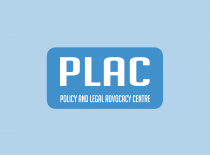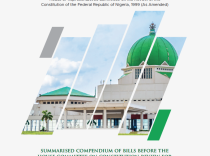The Acting President, Prof. Yemi Osibanjo has informed the National Assembly of his decision to withhold his assent to the National Lottery Act (Amendment) Bill, 2016, Dangerous Drugs Act (Amendment) Bill, 16, Currency Conversion (Freezing Orders) Act (Amendment) Bill, 16 and the Agriculture Credit Guarantee Scheme Fund (Amendment) Bill, 2016 that it had passed and transmitted to the President for assent.
In a letter read on the floor of both chambers of the National Assembly at the plenary session of Wednesday, 3rd February, 2017, the Acting President gave reasons for withholding his assent in line with Section 58(4) of the 1999 Constitution (as amended). For instance, he explicitly stated that his withholding of assent to the National Lottery Act (Amendment) Bill was due to the existence of a pending legal challenge to the competence of the National Assembly to legislate on the subject matter for amendment. He also expressed his concerns over certain words and phrases used in the Dangerous Drugs Act Amendment Bill that may be inconsistent with the spirit of the Principal Act.
The Acting President further mentioned that the surrounding board composition, funding arrangement, limitation of liability of funds and the proposal to increase the level of uncollaterised funds from N5,000 to N25,000 in the Agriculture Credit Guarantee Scheme Fund (Amendment) Bill, 2016 were of concern to him. In addition, he noted that some of the provisions in the Currency Conversion (Freezing Orders) Act (Amendment) Bill which deals with the modalities for communicating asset forfeiture orders were unacceptable.
However, Sen. Dino Melaye (APC: Kogi), who is the sponsor of the National Lottery Act (Amendment) Bill, raised a petition challenging the decision of the Acting President. Sen. Melaye argued that the Acting President had usurped the powers of the National Assembly by refusing to assent to the Bill. Citing Section 6 of the 1999 Constitution (as amended), he stated that “it was the responsibility of the Executive to assent to any Bill passed by the legislature and anyone who had a problem with it can go to the Court “.
Senate President, Sen. Bukola Saraki (APC:Kwara) in his response to the veto, stated that the Bills would be referred to the Senate’s legal department for review. Similarly, in the House of Representatives, the Speaker, Rt. Hon. Yakubu Dogara (APC: Bauchi) mentioned that the Bills would be transferred to the House Committee on Justice for further legislative action.
The powers to assent to a Bill are resident in a President who may choose to assent or veto a Bill. However, in accordance with Section 145 of the 1999 Constitution (as amended), President Buhari has delegated this power to Vice President Osibanjo before he went on a medical leave to the UK. Section 58(5) of the Constitution is clear on how the legislature can override the President’s veto. Under the aforementioned provision, the President’s veto can be overridden if the Bill is passed again by each chamber of the National Assembly by a two- thirds majority.
Prior to withholding his assent on the above-mentioned Bills, the Acting President had signed seven Bills into law. These include the Oaths (Amendment) Act 2017; Defence Space Administration Act, 2017; Veterinary Surgeons (Amendment) Act 2017; National Film and Video Censors (Amendment) Act 2017; Pension Right of Judges (Amendment) Act 2017; Nigeria Institute of Soil Science (Establishment, etc) Act, 2017 and the Mortgage Institutions (Amendment) Act 2016.





